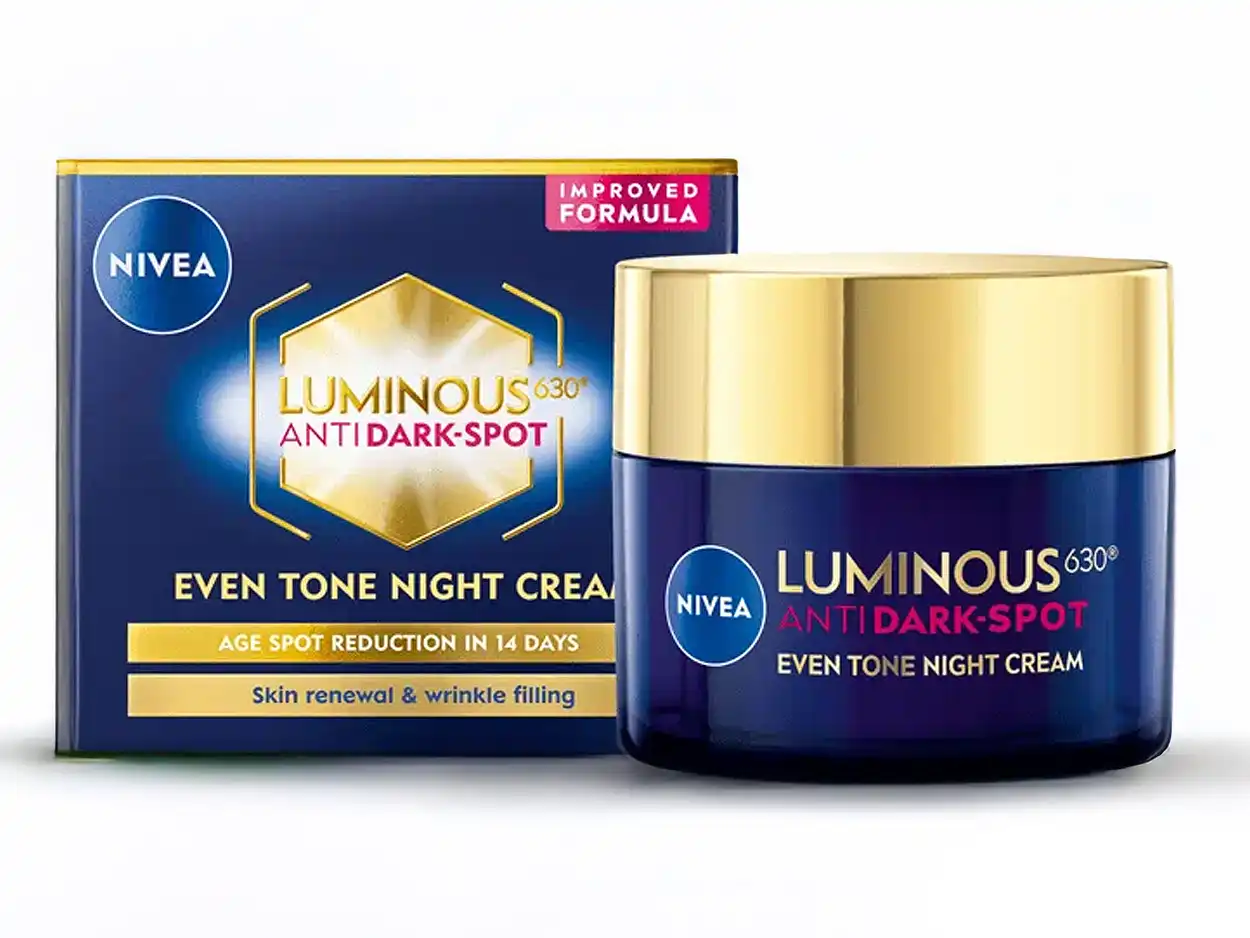NIVEA is one of those brands that often feels like it needs no introduction, but there are still a few people who might not be familiar with its range of skincare products. If you’ve been out of the loop, NIVEA’s new offering, sporting the rather grand title, “Cellular Luminous 630 Anti-Dark Spot Night Cream”, promises to reduce dark spots while you sleep, with a little help from patented Luminous630® and cell-activating Hyaluronic Acid.
After spending a full week using it nightly, this review aims to share honest thoughts on whether it’s worth the investment. This is not a paid or sponsored piece, and all opinions are entirely based on personal experience, bearing in mind that skincare can work differently for everyone.
What Is Cellular Luminous 630 Anti-Dark Spot Night Cream?
This product is classified as a night cream, meaning it’s designed to support the skin’s natural regeneration process while you sleep. Developed by NIVEA, it targets dark spots using an ingredient known as Luminous630® and cell-activating Hyaluronic Acid. The official description notes that Luminous630® helps reduce the appearance of existing pigmentation over time, while Hyaluronic Acid works to hydrate and strengthen skin overnight. It’s suitable for all skin types, and NIVEA states it’s also gentle enough for sensitive skin.
Like other overnight moisturizers, the goal here is to restore and balance the skin after the day’s wear and tear. Night creams in general tend to have richer formulas, intended to recharge the skin during the hours when it’s most receptive to repair. This particular one promises visible improvements in dark spots after several weeks, aiming for a more even, revitalized complexion the next morning.
Did It Work?
To really put this cream to the test, I temporarily retired my usual night cream for a few days, very scientific of me, I know! Starting from day one, I noticed how easy it was to spread onto the skin; it felt rich but not overly heavy, and my face looked moisturized immediately after applying. There wasn’t any unpleasant tingling or tightness, so it seemed gentle right from the get-go.
For the first few nights, I appreciated how my skin felt in the morning, still hydrated and slightly plumper, especially around the cheeks. The product absorbed quickly, so I wasn’t left with that greasy “pillow-face” feeling. Around the mid-week mark, I’d say my complexion seemed less dull, though any significant lightening of dark spots was very subtle. I wouldn’t say they vanished, but the skin around them looked a bit more even.
By the end of the seventh night, I could see some minor improvements in radiance overall. My dark spots, however, were only marginally less visible, which might mean the product needs more than a week to truly live up to its claims. Still, I can’t deny that my skin felt well-moisturized and looked a bit softer in the mornings.
So, did it fulfill its promise to reduce dark spots? Somewhat, there were small positive changes, and the formula definitely felt nourishing. However, I’m not quite convinced yet. Given how minimal the results were within my seven-day test, I probably wouldn’t add it permanently to my skincare lineup, at least not right away. It wasn’t a disappointment, but it didn’t fully win my heart either.
Cellular Luminous 630 Anti-Dark Spot Night Cream’s Main Ingredients Explained
Looking at the ingredient list, a few names might jump out right away: Glycerin, Shea Butter (Butyrospermum Parkii Butter), and Dimethicone. These are common moisturizers that help lock in hydration while maintaining a soothing texture. You’ll also spot Sodium Hyaluronate, the salt form of Hyaluronic Acid, which is known for its ability to hold onto water and keep skin plump. Luminous630® (listed as Isobutylamido Thiazolyl Resorcinol) is the star of the show, targeting dark spots by helping to break down existing pigmentation and prevent new spots from forming. It’s not an overnight miracle worker, but it plays a key role in gradually evening out the skin’s tone.
Isopropyl Palmitate, another ingredient here, sometimes gets flagged for being “comedogenic,” meaning it could potentially clog pores and lead to breakouts if your skin is particularly sensitive or acne-prone. However, results vary from person to person, so a patch test could help you see how well your skin tolerates it. On the other hand, Dimethicone tends to be non-comedogenic, so it shouldn’t cause issues for most people.
As for whether it’s vegan or vegetarian-friendly, the brand doesn’t explicitly certify the product in that regard. Although there aren’t obvious animal-derived ingredients, it’s still best to double-check if you follow a strict vegan or vegetarian routine. In the meantime, it’s good to know there are no glaringly harsh elements like parabens or strong alcohols that could irritate the skin. It does contain fragrance (Parfum), so anyone with high sensitivity might want to do a quick patch test before committing to nightly use.
Overall, the formula combines hydrators, emollients, and NIVEA’s patented Luminous630® complex in an effort to both strengthen and brighten the skin. Nothing in here stands out as a universal red flag, but it’s always wise to keep an eye on how your skin reacts, especially if you’re prone to breakouts or prefer minimal fragrance in your products.
What I Liked/Didn’t Like
Here’s a quick overview of the good stuff and some points you might want to keep in mind:
What Works Well:
- Feels nourishing on the skin and helps maintain hydration overnight
- Gentle formula with minimal irritation or redness
- Targets dark spots gradually without stripping the skin
What to Consider:
- You may need patience to see more significant results on darker spots
- The texture could feel a bit rich if you prefer lighter night creams
- Fragrance is present, so it may not suit those with fragrance sensitivities
My Final Thoughts
This night cream is a worthy contender if you’re hunting for a gentle formula that supports healthy skin overnight and takes slow but steady aim at dark spots. Having tried my fair share of night creams in the past, I wanted to give NIVEA Cellular Luminous 630 Anti-Dark Spot Night Cream a fair shot. After using it consistently, I’d say it offers solid hydration and a subtle boost in radiance, enough that I’d give it a 7/10, with the caveat that those looking to erase darker spots might need more patience (or stronger treatments) to see real dramatic results. It’s a decent option for anyone seeking a nourishing, smoothing product, but I wouldn’t go so far as to call it the ultimate game-changer.
Is it worth recommending to a friend? Maybe, especially if they’re dealing with mild pigmentation and desire a slow-and-steady approach. On the other hand, those with stubborn dark spots or a preference for extremely lightweight formulas might be left wanting a bit more. Personally, I found it pleasant enough, yet not jaw-droppingly transformative. Ultimately, there’s real value in finding a good night cream that works well with your skin’s rhythms, and this one certainly has a lot going for it, provided you don’t expect miracles overnight.
If you’re on the fence, there are other night creams worth exploring. I’ve used Nocturnal Revive Cream by Deascal, which is an excellent allrounder: covers all bases at a great price and suits just about any skin type. Pro-Collagen Night Cream by ELEMIS has also found a place in my rotation from time to time, delivering a luxurious feel and solid hydration without feeling heavy. And for those days when I desperately need a skin pick-me-up, I’ve turned to Midnight Secret Late Night Recovery Treatment by Guerlain for a quick overnight boost that leaves me looking more alive by morning. Each of these alternatives offers its own unique spin on overnight care, so they’re worth a peek if you want to compare formulas or switch things up.
Before adding any new product to your regimen, it’s important to consider potential sensitivities and keep in mind that consistent use is usually required for long-lasting results, no cream, after all, can wave a magic wand. A patch test is always a good idea, especially if your skin tends to react to new ingredients. Taking the time to find what works best for you can make all the difference, and it’s worth remembering that the effects of many skincare formulas aren’t permanent unless you stay committed to using them over time.

